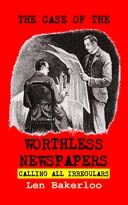Explore

You want to read this book if you care about the news, how it is reported, how it is used, how it is misused, or what it means.
You can use this book in a classroom on civics, journalism, or business.
Or you can read this book as a confection... an enjoyable way of passing the time.
Here is the surface plot (but, like the news, you'll have to read it, think about it, and do a little digging to find what is below the surface:
More than 100 years ago Mr. Sherlock Holmes and Dr. John Watson learned the secret of eternal life. This explains how they were able to fight crimes and pursue justice for more than a century without seeming to age.
By 1982 people had stopped caring about learning the truth. Without consulting clients, Holmes transformed himself into a hedge fund manager making rich people richer, and Dr. Watson became a speech writer for many of the world's most influential people.
They assumed new identities and for three decades they lived separate lives as they became wealthy beyond measure. However, they began to age rapidly and in the fall of 2015 Holmes rented 221b Baker Street where he hoped to live out his final days. They reunited just as Holmes was about to apply the “seven percent solution” to his problems. But then a cryptic message arrived that sent the pair on their final adventure.
Now their time is running out. In Calling All Irregulars they ask their trusty band of misfits to join the battle for truth and justice against the news media under the influence of the evil Professor Moriarty, who only cares about page views and profits.
This book includes more than 45 puzzles that you can solve. Some are so easy that they will take only a few minutes and others might require dozens of people to collaborate for weeks or longer. Instructions are provided for how you can follow the progress of your fellow "Irregulars" as you become a consulting detective just like Sherlock Holmes.
Why read this book? Have your say.
You must be logged in to comment.
Editions


I wrote this book because I have come to believe that most “news” today does most people more harm than good. Although some news is useful, if the harm exceeds the good, then its “net worth” is less than zero – and that is what I mean by “worthless.”
However this case is hard to make in a straightforward fashion. It can’t be done in a Tweet, a Facebook post, or even a 500 word essay, and that is part of the problem: The “news” has shortened attention spans – everything interrupts everything else – and that makes it hard to gather your thoughts.
But people still tolerate long-form escapist fiction, and that is why I’ve decided to create a series of detective stories whereby Mr. Sherlock Holmes will present the evidence, and you will see if you can figure it out for yourself.
In the Case of the Worthless Newspaper series you will learn how to distinguish between a hypothesis and a truth; an opinion and a fact; a reasoned argument and a verbal fistfight. You will learn how to dig into a story to find its relevance and meaning. And you will regain a sense that you can make a difference. Your world is your oyster where irritants don’t need to drive you crazy but rather – with a little skill and hard work – you can turn those irritants into pearls.
The first in the series is called Calling All Irregulars because, as with Conan Doyle’s original character, this modern day Sherlock needs the help of his band of misfits to help take responsibility for the news and hack it. You can read this book as a confection, if you wish, or you can treat it as a puzzle book that poses more than 45 questions for you to solve on your own or in collaboration with others.
Calling All Irregulars is particularly appropriate as a book worth discussing in a class on civics, business, or journalism.
Or you can just read and invent your own uses.
Sherlock Holmes would say, “The game is afoot; there is no time to waste.” This free edition comes with a money-back guarantee so you have nothing to lose.